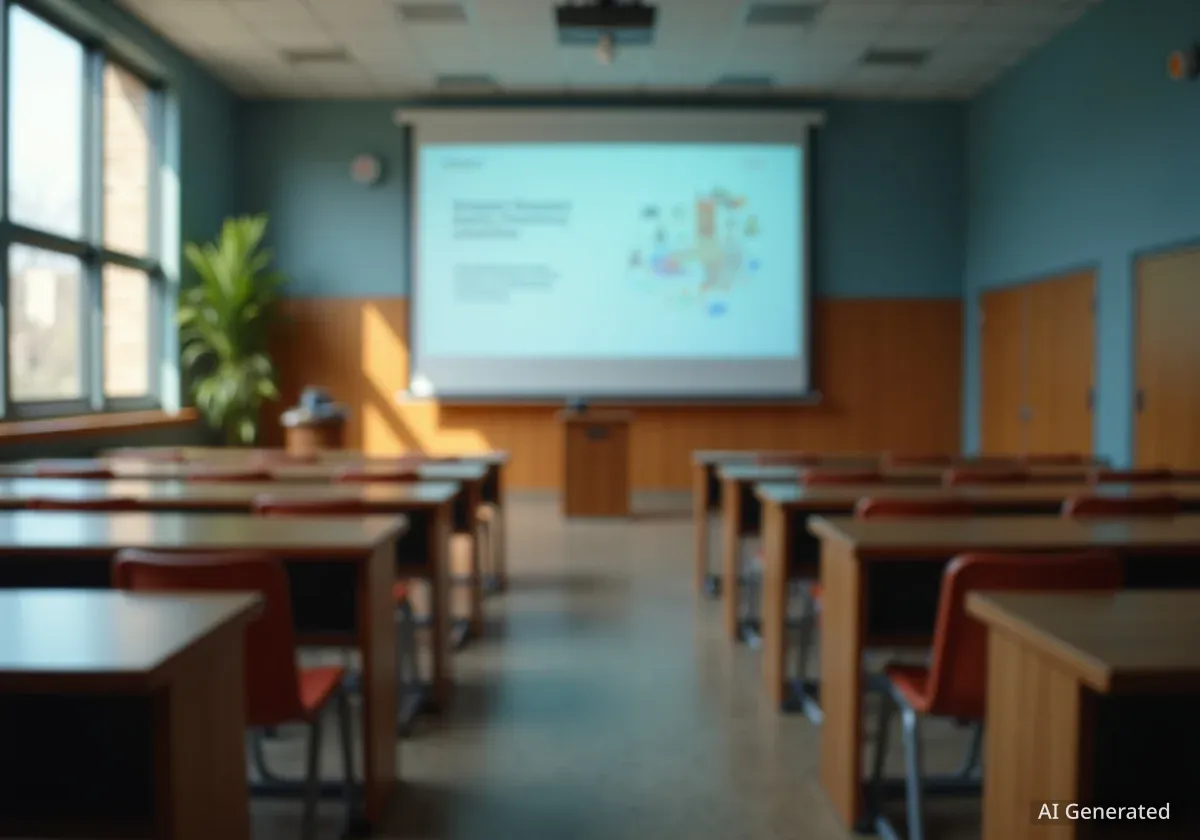Mark Welsh has resigned as president of Texas A&M University following a significant controversy that originated from a classroom discussion on gender. The dispute, captured in a viral video, led to the dismissal of a professor and two other academic leaders, culminating in Welsh's departure on September 19.
Key Takeaways
- Texas A&M President Mark Welsh resigned effective September 19.
- The resignation followed a viral video of a student-professor dispute over a gender lesson in a children's literature class.
- Professor Melissa McCoul was fired after the incident, along with two senior academic administrators.
- The university cited that the course content was inconsistent with its official description.
- The Board of Regents is now searching for an interim and a permanent replacement for the presidency.
President's Departure Amid Controversy
The leadership of Texas A&M University saw a major shift with the resignation of President Mark Welsh. His decision to step down was confirmed in a statement by Chancellor Glenn Hegar, who announced the resignation would be effective at 5 p.m. on September 19.
While acknowledging Welsh's service, Hegar indicated that a change in leadership was necessary for the university's future. This move comes after a period of intense public scrutiny for the institution.
"President Welsh is a man of honor who has led Texas A&M with selfless dedication," Hegar stated. "At the same time, we agree that now is the right moment to make a change and to position Texas A&M for continued excellence in the years ahead."
The university's Board of Regents will now oversee the transition, beginning with the appointment of an interim president while a national search for a permanent successor is organized.
The Classroom Incident That Sparked the Crisis
The series of events leading to the administrative shake-up began in a children's literature course. A video recording of an exchange between a student and Professor Melissa McCoul gained widespread attention online.
In the video, the student is seen challenging Professor McCoul's lesson, which included material acknowledging the existence of more than two genders. The student claimed this content was illegal, referencing a past executive order from the Trump administration that restricted the use of federal funds for promoting certain gender-related concepts.
Professor McCoul responded by stating that her lesson was not illegal and informed the student that they were free to leave the class if they were uncomfortable with the material. The circulation of this video online triggered a strong reaction from the public and university administration.
Understanding the Executive Order
The student likely referred to Executive Order 13950, issued by President Donald Trump in 2020. Titled "Combating Race and Sex Stereotyping," the order prohibited federal agencies and contractors from conducting workplace training that included certain concepts it defined as "divisive." While it primarily targeted federal workplaces and contractors, its language was often cited in broader debates about education. This executive order was later revoked by President Joe Biden in 2021.
University's Response and Subsequent Firings
Following the video's viral spread, the university administration took swift and decisive action. President Welsh ordered the termination of three individuals involved in the approval and teaching of the course content.
First, Professor McCoul was fired. The official notice of termination reportedly stated that her teaching did not align with the approved course description. It further alleged that she had been instructed to change her lesson plan to match the description but had failed to do so.
In addition to the professor, two senior academic leaders were also dismissed:
- Emily Johansen, Head of the English Department
- Mark Zoran, Dean of the College of Arts and Sciences
The university's reasoning for these firings was that they had approved course content which the administration deemed inconsistent with what was officially cataloged for the children's literature class. This action was seen as an attempt to control the academic curriculum and align it with a specific standard.
Chain of Command in Academia
In most universities, course content is developed by professors, approved by department heads, and overseen by a college dean. The dismissal of all three levels of this academic chain—professor, department head, and dean—is an unusual and significant administrative action.
Professor Disputes University's Claims
Professor McCoul has challenged the university's official account of her termination. Through her legal counsel, she has disputed the core allegations made against her. Her lawyer stated that she was never instructed by the university to alter her course content before the incident occurred.
This counter-claim suggests a different narrative, one where the professor was not given prior warning or an opportunity to adjust her teaching materials. It raises questions about whether the termination was a reaction to the public outcry from the viral video rather than a pre-existing issue with the curriculum.
The discrepancy between the university's statement and the professor's account remains a central point of contention in the ongoing discussion about the events at Texas A&M.
Future Leadership and Academic Questions
With Welsh's resignation, Texas A&M University enters a period of transition. The Board of Regents is tasked with finding stable leadership to navigate the institution through the aftermath of this controversy. The search for a new president will be critical in setting the future direction for one of the largest public universities in the United States.
This incident has also ignited a broader conversation about academic freedom and institutional governance. Faculty and academic observers across the country are watching closely, as the events at Texas A&M touch on fundamental questions about who controls what is taught in a university classroom and how institutions respond to external political and social pressures.
The outcome of the search for a new president and any subsequent policy changes will likely have a lasting impact on the academic environment at Texas A&M and may influence similar debates at other public universities.





